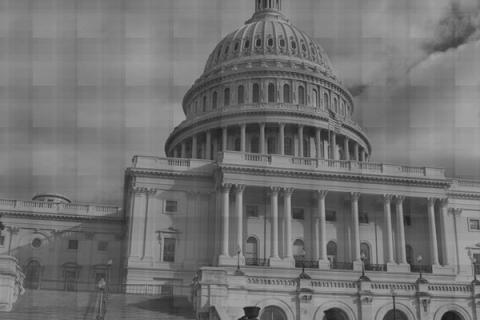
According to a pair of new Pew polls, Republican presidential candidate Mitt Romney has nearly caught up with President Barack Obama on the handling of foreign policy.
The first poll still has Obama leading 47-43, which is down from the 15-point lead he held earlier. The second poll found that independents disapproved of Obama's reaction to the latest developments in Libya 40-28.
The results of these polls came before the much-discussed exchange between the two candidates at Tuesday night's debate at Hofstra University, so it's hard to tell what effect the debate had on the election regarding this issue. That night there was only one foreign policy-related question and the participant asked why the:
"State Department refused extra security for our embassy in Benghazi, Libya prior to the attacks that killed four Americans. Who was it that denied enhanced security and why?"
The exchange quickly morphed into the way the Obama administration described the act that killed US ambassador Chris Stevens and little to do with the reason why there was no extra security. The Romney campaign immediately released a statement on September 12 asserting that the Obama administration sympathized "with those who waged the attacks."
At the debate, Obama rebutted:
"The day after the attack, Governor, I stood in the Rose Garden, and I told the American people and the world that we are going to find out exactly what happened, that this was an act of terror."
The Obama administration's version of events in Benghazi has been nebulous and the phrase "act of terror" is a little vague, but in the midst of a speech about the slain ambassador, it's most likely the president meant the act that killed Chris Stevens.
Regardless, the substance of the disagreement was over whether the Obama administration said the incident was premeditated or evolved from a public demonstration that went awry, not whether or not an "act of terror" led to the death of Stevens.
While these new poll numbers are good news for Romney, Monday's foreign policy debate could prove Romney's undoing. President Obama, who has executed or extended much of the Bush administration's foreign policy, has held a substantial lead over the Republican candidate in this category.
By winding down the wars in Iraq and Afghanistan, succeeding in killing Osama bin Laden, and until recently, intervening in Libya, Obama's foreign policy has been politically successful, or at least non-toxic because, unlike during Bush's wars, the actions he's started haven't resulted in pictures of dead Americans coming home everyday.
Romney has moved to the center on a variety of issues since he wrapped up the GOP nomination, namely touting the success of his Massachusetts health care plan and his insistence at the first debate that he would not lower taxes on the wealthiest Americans. Yet, at the foreign policy debate Romney may have painted himself into a corner with the way he has presented himself on the issue.
Just after the first debate, Romney delivered a foreign policy speech at the Virginia Military Institute (VMI) that resurrected many hallmarks of the Bush administration. There, Romney bemoaned the "daylight" that had been put between the US and Israel and declared, "Iran today has never been closer to nuclear weapons capability."
As for the withdrawal from Iraq, of which Obama merely executed the Bush era Status of Forces Agreement, Romney lamented, "America's ability to influence events for the better in Iraq has been undermined."
Since President Obama has executed or extended many of the Bush era mechanisms, Romney is in a difficult position. A candidate who countered that Obama violated civil liberties with the extension of the Patriot Act and the passage of the National Defense Authorization Act-- or that he flaunted the Constitution by intervening in Libya without congressional approval-- would be in a good position to collect voters who are disaffected with Obama's foreign policy.
However, the core of Romney's criticism of Obama's foreign policy is that it hasn't done enough. Therefore, unless he completely and unexpectedly overturns the Republican foreign policy consensus, Romney is left with little except rallying the most ideological of his supporters.
While he could surprise the audience and spurn much of his bellicose rhetoric, at the foreign policy debate Romney risks alienating voters, so success likely hinges on which Romney shows up. If it is the Romney who has remade himself as a potentially non-ideological commander-in-chief, he may be able to capitalize on the feeling that the September 11 incident in Benghazi is a legitimate reason to question Obama's foreign policy credentials.
If it is the Romney who gave the VMI speech, he will remind voters, especially independent voters, that the reason the Republicans were thrown out of office beginning in 2006 was that voters found them too reckless and too incompetent on foreign policy.
